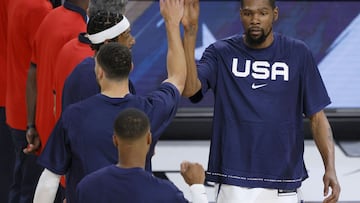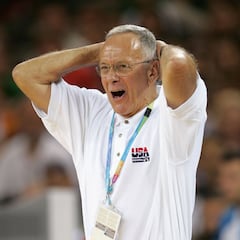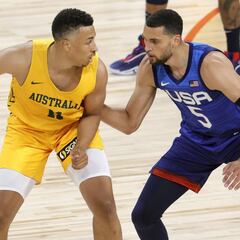Tokyo Olympics 2021: Six reasons for Team USA's poor form
As they prepare for the 2020 Olympic Games, Gregg Popovich's USA team have suffered back-to-back friendly defeats to Nigeria and Australia.

It’s a stat that has spread like wildfire across social media: Gregg Popovich now has a better win percentage in 25 years as coach of the San Antonio Spurs (65.9% between regular season and playoffs) than he does in charge of Team USA: 64.3%, the result of a dreadful 9-5 record that includes four defeats in the last five, and two in two meetings with Australia, in warm-ups for the 2019 World Cup and this summer’s Tokyo Olympics. Before suffering losses to Nigeria and Australia that have stunned Americans and led to boos in Las Vegas, where they are completing increasingly fraught preparations for the 2020 Games, Team USA had only lost two friendlies out of the 56 they had played since they began fielding NBA players in 1992 (the year of the Dream Team in Barcelona). That 54-2 record is now 54-4. Between 21 July 1992 and 9 July 2021, two defeats in 10,581 days. Between 10 and 12 July 2021, two in three.
It’s only the third time this century that the USA have lost two games in a row - and it’s a bad omen. The two other occasions it happened came in competitions that bring back bad memories for Team USA: the 2002 World Cup, where they finished sixth, and the 2019 World Cup, where they limped home in seventh, their worst ever result at a major tournament. And Mike Krzyzewski, Popovich’s predecessor, only lost one game out of his 76 at the helm of the national team. A defeat against Greece in the 2006 World Cup semi-finals, which was followed by 58 straight wins, an eternity without losing until the reverses against France and Serbia in 2019 that condemned a team with a makeshift roster to the ignominy of the battle for seventh place.
Final. pic.twitter.com/R62BgDSYs8
— USA Basketball (@usabasketball) July 13, 2021
Let’s get one thing clear: the USA remain the overwhelming favourites to win gold in Tokyo. But these defeats are a major wake-up call for them, not least because they highlighted recurring issues. Problems that mean their journey to a fourth straight Olympic title - and their seventh in eight Games - may be far from straightforward, despite Popovich’s rotation including a combined 37 All-Star selections and $2.6bn in NBA contracts. These problems are:
The USA have a terrific team, but it's not their best possible team
This Team USA is much better than its 2019 incarnation, a patched-together side beset by absences (but that nonetheless should not have finished seventh). It’s full of stars and has Kevin Durant, but it’s not the best team they could possibly pick. Aside from Durant, Damian Lillard would likely make it into America’s strongest team (and perhaps Draymond Green, to complete the inside rotation) but, for one reason or another, they are missing LeBron James, Stephen Curry, Kawhi Leonard, Anthony Davis, James Harden, Kyrie Irving, Chris Paul, Paul George, Jimmy Butler, Klay Thompson…
The gap between the US and the rest of the world is closing
Many of the problems the USA have are not new, but they were masked by the step-down in the quality elsewhere. That gap has been steadily closing over the years. And although the US still boast the overwhelming majority of the top global talent, the instability caused by the jump to FIBA basketball and the chopping and changing in every roster hurt them enough to bring the rest of the world closer after decades of growth in the worldwide game. The USA’s opponents are now also NBA teams. Nigeria beat the Americans with eight players from the league in their ranks, while Australia had six (and were missing Ben Simmons). France have five, Spain four… There’s only one Olympian in the 2020/21 All-NBA Team, and that’s Slovenia’s Luka Doncic. The US have one player from the second team (Lillard) and one from the third team (Bradley Beal). The rest of the world has Doncic in the first team and Rudy Goebert in the third. In the 2021 All-Star Game, there were eight non-US players, while there were three in the All-NBA Team: Doncic, Giannis Antetokounmpo and Nikola Jokic. And the latter two have won the last three NBA MVP awards between them: two for the Greek, one for the Serb.
Team USA have lost continuity
When the United States changed direction and sought to change the culture of the team after their disastrous campaign at the 2004 Olympics, they played huge emphasis on commitment and continuity. It was no longer enough to simply call up a handful of stars, throw them together for a few days in Las Vegas and send them into the tournament. The US began to work in Olympic cycles, seeking to commit stable groups of players to summer camps, friendlies and major tournaments: World Cup, the AmeriCup, the Games. That has started to be lost. Partly because getting back to winning ways caused interest to wane (wounded pride snapped their best players into action when the Redeem Team won gold at Beijing 2008), and partly because of the packed basketball schedule, and contractual and commercial interests. The team at London 2012 was made up of a combination of players from Beijing 2008 and the 2010 World Cup. Now, only two remain from the catastrophe of 2019, Jayson Tatum and Khris Middleton, who is one of the three players who are still involved in the NBA Finals (together with Devin Booker and Jrue Holiday). Only three other players in the roster for Tokyo have experience of a major FIBA tournament: Durant (2010, 2012 and 2016), Green (a peripheral figure at Rio 2016) and Kevin Love, who has been suffering an injury nightmare and hasn’t played for the USA since London 2012.
Endemic issues with the centres and power forwards
Once more, the USA look vulnerable underneath the rim. Nigeria won 13 offensive rebounds and Australia blew them away in points scored in the paint (22-44). The roster only has one pure centre, Bam Adebayo, who is one of the best in his position in the NBA but is only 6 feet 9. Draymond Green is one of the best defensive players in the history of the NBA, but in 2016 really struggled to adapt to the FIBA game and, what’s more, is 6 feet 6. Kevin Love is 6 feet 8 and has never been a player for scraps in the paint. In the NBA, Tatum and Jerami Grant work as open fours and Durant does everything, a point guard-small forward-centre with superlative, historic levels of talent. But the FIBA game isn’t so suited to small ball and open, versatile forwards. In 2016, in addition to Green, the US had DeMarcus Cousins and DeAndre Jordan. In 2019, Brook Lopez and Myles Turner. Now Team USA are lacking in height… and will have a serious problem on their hands if Adebayo suffers an injury or picks up too many fouls. The versatility of their small forwards and the scoring talent in the group should prove enough, but we’ve already seen other occasions when, put simply, that hasn’t been the case. This problem isn’t a short-term one, either: the best centres in the NBA are mostly foreign: Joel Embiid, Nikola Jokic, DeAndre Ayton, Rudy Goebert, Karl-Anthony Towns, Clint Capela…
Too many scoring stars?
Related stories
It may sound strange, but having so much talent and so many points in the team has its negative side to it. There are not many playmakers, and a lot of guys used to racking up 30 points without breaking a sweat. A nice problem to have? To a large extent, it’s one any coach would want, but the odd extra creator wouldn’t be a bad thing, and Trae Young has already been mentioned, as has Zion Williamson as an explosive option in the paint. Durant, Lillard, Beal, Tatum, Lavine, Booker… they’re mostly scorers. In a way, the best distributors in the team are the inside players: Adebayo, Green and even Love. Another specialist for the defence also wouldn’t go amiss, particularly on the outside. Holiday, one of the men still on NBA Finals duty, may be important in that regard.
The rules and the playing style change in the FIBA game...
It happens time and again. The Americans look at the referees with astonishment after not being awarded fouls in certain plays or being penalised in others. They play with less aggression because they don’t know when and where they can go in hard, they’re not used to the different goaltending laws… With only a short period to prepare, they face major changes not only in the length of games and the rules, but also in basketballing philosophy and style. And that makes life difficult for them against teams who have plenty of NBA talent but are also more used to the FIBA game, and have been competing together in a settled team for years. It’s a challenge that talent, allied with hard graft in the lead-up, normally overcomes. That’s the task facing Popovich and his players.
- Selección baloncesto EEUU
- Kevin Durant
- Gregg Popovich
- Damian Lillard
- Luka Doncic
- Joel Embiid
- Antetokounmpo
- Mike Krzyzewski
- Bradley Beal
- Bam Adebayo
- Jayson Tatum
- Khris Middleton
- Jerami Grant
- Kevin Love
- Devin Booker
- Draymond Green
- Zachary LaVine
- Team USA
- Olympic Games 2020
- FIBA
- Basketball
- National teams
- Olympic Games
- Sports Federations
- Competitions
- Sporting organisations
- Sports


